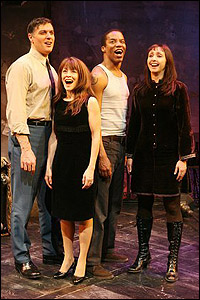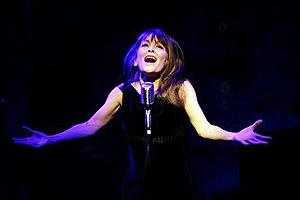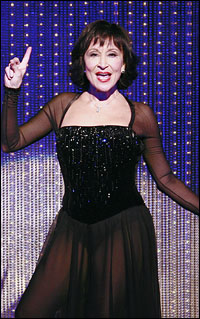
GAY MARSHALL
Gay Marshall, who played the entire run of the critically acclaimed revival of Jacques Brel Is Alive and Well and Living in Paris at Off-Broadway's Zipper Factory — where she offered thrilling versions of "My Childhood," "Marieke" and "Sons Of," among others — has once again turned her attention to the songs of the iconic French chanteuse Edith Piaf. The Cleveland-born singing actress presented her Piaf repertoire at the Metropolitan Room in October 2008, and this diva lover was lucky enough to catch her final performance at the intimate nightspot, where she delivered heartfelt, powerfully sung versions of such tunes as "La Vie En Rose," "No Regrets," "Spring At Last!" and "Avec Ce Soleil." Several of the tunes also boast translations/adaptations by Marshall, who lived and performed in France for many years. Those who missed Marshall last year, fear not: The intelligent actress, who made her Broadway debut as Diana Morales in A Chorus Line and played Grizabella in the original French production of Cats, will again offer Piaf: Queen of Heart Sept. 15, 22 and 29 at 7 PM and Oct. 1 and 8 at 7:30 PM at the Metropolitan Room; she has also released on CD the wonderful "Gay Marshall Sings Piaf." Earlier this week I had the pleasure of chatting with Marshall about all things French; that interview follows.
Question: In the one-woman show you had done at the Zipper during the Brel run, you seemed to suggest that you have a love-hate relationship with France. Is that accurate?
 |
||
| Robert Cuccioli, Gay Marshall, Rodney Hicks and Natascia Diaz |
||
| photo by Carol Rosegg |
Marshall: Oh yeah. It seemed to me that because of the theatrical traditions there, I think they are incredibly generous. They have enormous admiration for the American musical comedy, that's for sure. When we did Cats and it was translated into French, really 50 percent of the audience was miffed because they would have liked to have heard it in English. This is also part of their very complicated collective personality because if you had done it in English, they would have said, "But we are in France!" [Laughs.] I think it is kind of a deep-seated cultural point of amusement for them. It keeps life interesting to always play the devil's advocate, at least that's been my experience. They'd rather have an interesting conversation than get along with you.
Question: And now you're going to revisit your Piaf show at the Metropolitan Room.
Marshall: Yes.
Question: When did you first discover Piaf?
Marshall: I had never heard her sing until I finished reading the story of her life. It was right before I did Chorus Line, so that would be about 25 years ago. I was fascinated by the story of her life and by the person who told it, who was her "half-sister" Simone Berteaut. Once I got started on my research into her life by meeting the people that worked with her, when I first went to Paris, I found everyone hated [Berteaut], and they tried to deny almost everything — not everything she had written, but the personality side of Piaf. It's very interesting because that was just a culture clash. She was from the street, like Edith Piaf, and as Piaf got more and more famous, she became more and more of an embarrassment to the upper-class entourage that Piaf had acquired. But I'm so glad she wrote that book. I have a very big soft spot in my heart for her. After I read this story, totally by chance, I really wanted to hear the music. I knew the stories of the people — how they met Piaf, how they got inspired by her, what they wrote for her, what they based it on, how they all worked together, how they stuck with her throughout her entire career. It was really fascinating. I had never intended to go to France. I didn't have a particular love of French or traveling. My main interest was England because I had been to English drama school, and I was headed for classical theatre. Question: Do you remember the first time you heard Piaf sing?
Marshall: I found this double album of hers randomly after searching and searching in record stores. It was obviously vinyl, and it had translations of the songs in English next to them, very literal, so that I had an idea what she was singing. Her voice just went right through me even when I didn't understand the lyrics. It wasn't particularly the beauty of her voice, although I do love it — it seemed as though her singing was a concrete work of art, like something you could touch. And yet, of course, it is intangible. I had never really been affected by anyone's singing like that before. It was so full of passion and emotion and compassion. Sometimes joy, sometimes tragedy, but it was just so full. It had an enormous impact on me. That's all I wanted to do then. I had to learn French, I had to sing those songs, no matter what.
Question: When did you start learning her repertoire?
Marshall: I tried to learn the songs phonetically. I used to sit by the record player and just listen over and over again. And now it's pretty funny to me when I remember what I thought the words were. I was close! [Laughs.] I was taking enormous amounts of ballet classes at that point, and I had a wonderful friend who was a brilliant dancer and a great guitar and piano player. His name is Chris Tabor, and I asked Chris if I could get a gig, if he would accompany me. I went down to this very sort of chic French restaurant in Cleveland and said that I'd heard they were looking for a singer. And they said actually they weren't, and I said, "Well, you should be." Basically, I talked them into letting me sing there, and that became a wonderful job that then turned into me singing five nights a week — from not singing at all to singing five nights a week at different establishments. And not just French, I got a Dixieland blues/jazz band, and then Chris and I worked up a repertoire of Broadway tunes and standards. We had very, very different repertoires, and we worked a lot.
Question: When was the first time you did a whole show of Piaf songs?
Marshall: I had sung for a benefit in Cleveland for the Great Lakes Shakespeare Festival, and the man who ran it asked me if I would put together a show about her, so I did. What happened was just an unbelievable coincidence. At the time I was on the road, and I was in Las Vegas, and I used to spend the wee hours of the morning with an astoundingly elegant and brilliant pianist named Kirk Stewart, who played in the lounge of the Desert Inn. We would go and have breakfast together. We hardly spoke. We just liked each other. He would read Variety, and I would read the New Yorker. One day he said to me, "Didn't you say you sang Edith Piaf?" I said, "That's kind of my first love." He said, "There's a contest in New York City. Maybe you should check that out." So, basically I put my job on the line, and I went to New York and I won this contest.
Question: What was the contest?
Marshall: It was singing Piaf. I didn't know what the prize was for it. I thought it was like a magnum of champagne or something, and it turned out to be a week at the Grand Hotel for two. I took my best friend and had an amazing time, which helped me research the show.
Question: Have you performed the Piaf repertoire in France?
Marshall: I have never done a theatrical show. I have sung a lot of Piaf in France. That's kind of a funny position to be in because singing French to the French is terrifying. My favorite reaction of theirs is — you meet people at parties and they say, "What do you do?" And you say, "Well I sing." They say, "What do you sing?" And I say, "Actually, I sing a lot of different things, but my first loves are Piaf and Brel." And then they say, "Oh? You sing Piaf???" And I say yes, and then they put on a huge smile, and it's as if they are sort of symbolically patting me on the head, they go, "Formidable!" It is so condescending! [Laughs.] So basically I stopped telling French people I sing Piaf. I just say, "Come hear me," and then we get along great.
Question: Why do you think Piaf has remained popular all these years?
Marshall: I think it's the same phenomenon as what keeps American myths alive, like Marilyn Monroe and Fred Astaire and great actors, because there is nobody like them. Before, although commercial success was always necessary, there was really a strong artistic drive to not necessarily have a product but for everyone to go to their artistic limits trying to create something unforgettable. . . . Rather than taking a poll and figuring out what people wanted to hear, the way that record companies do now, and then creating that product so that sales will be good, it mostly, I believe, sprang from the passion and the heart of the artist in question.
Question: You've translated some of the songs into English. How difficult is the process?
Marshall: [Laughs.] I tell you, I love translating these things but I am not quick. It takes forever because I love this language. I love the French language, and I find it to be incredibly more layered and subtle than English. Of course, the French find English to be incredibly more layered and subtle than French, so I guess the cultural grass is always greener. It's a very long process to get the meaning and the feeling of the song. I wouldn't call them translations. I would call them adaptations. Sometimes you can do it. You can get it to rhyme and say exactly what it says in the original language. Sometimes you just have to have a metaphorical picture of it and put it across in other terms. If you have "two dancing hearts," for instance, that's a tough thing to put over in English without everybody sort of doubling over in laughter. . . . It was really a long process for me, and I had the encouragement of a couple of people who actually wrote for Piaf, which was very exciting, notably Michel Rivegaucheche. I met him when I first got to France, and he was thrilled that I wanted to put his work into English, and he was encouraging and so pleased. When you have that kind of support, it gives you a lot of motivation to carry on. When I met Georges Moustaki, he was trying to quit smoking. It was the first day or the second day of him giving up cigarettes, and he was in a foul mood, and he just looked at everything I wrote and said, "I didn't say that." I said, "No, but it amounts to that, don't you see?" But he was just desperate for a cigarette. That was kind of funny. In the end he said, "It's fine, it's fine." But it was a pretty uncomfortable conversation. [Laughs.]
Question: What I liked about your interpretation of the Piaf songs is that you found the pathos, but you also found the joy in her singing and in these songs.
Marshall: That's very important to me . . . . There are three movies that I've seen [about Piaf]. . . . I find that they always reduce this woman to some kind of a vulgar guttersnipe who miraculously sang unbelievably well. When you look at the progress of her life and her career, you can't deny that you're dealing with somebody who was incredibly intelligent, albeit uneducated for quite awhile. Nevertheless, she had serious smarts. She had this indefinable gift of interpretation, and she was such a hard worker, sang in many different languages by the time she had established herself as one of France's most up-and-coming singers, and she toured all over the world. I just find her development as an artist and as a person unbelievably interesting and not something that can be reduced to what I've seen in these movies. The last one that came out, which was marvelously played by Marion Cotillard, who I find to be a brilliant actress — nevertheless I don't like what she was given to do. When I was lucky enough to meet the people that worked with her . . . they described somebody who totally fascinated and motivated them. And it was difficult, but I think everybody's difficult, quite frankly. For instance, the way that her drug addiction is portrayed in the [recent] movie ["La Vie en Rose"] makes me crazy because it looks as though she's just looking for kicks like some blasé down-and-out diva who had it all. It doesn't bother to explain that doctors put her on morphine because she'd been through several car accidents that were nearly fatal, right in a row. As soon as she'd recovered from one, bang she had another one. And she didn't drive, so it wasn't a question of her being out of control at the wheel either. But this is all passed over, and it just shows her passed out on this bed with a bloody needle beside her. I found that wretched, absolutely wretched, and what a cheap shot. And I don't understand why someone wants to leave that impression of her. She has so much else to be celebrated about.
Question: If you could go back in time and catch any one performer, would Piaf be the one?
Marshall: I guess if I had my druthers, I'd like a concert where every song could be by somebody else. [Laughs.] I would kill to see people like Ethel Waters and Duke Ellington and Dinah Washington and Jacques Brel. Gosh there's so many, it's difficult to say. But yeah, I'd kill to have seen Edith Piaf. I've seen her on film of course, and I'm grateful for that, that those exist. I just think that she was so remarkable, and I think it's a fact that she's more interesting than the way she has been portrayed. Look how long she's lasted and continues to last.
 |
||
| Gay Marshall |
||
| photo by Carol Rosegg |
Marshall: That was really great. I can't say enough about the atmosphere, not only in the audience, but onstage. I have five musicians that are just a total dream team. It sounds so corny, but it's true. Eric Svejcar, who I met when I was doing Jacques Brel the first time up at Capital Rep, is just a human chunk of music. I just feel like music drips off of his fingers. I feel like I met the American male version of Marguerite Monnot — the way that Piaf used to describe her beloved composer friend, that's how I feel about Eric Svejcar. It's the optimum experience having an accompanist like him. So when Eric said that he would do the shows, I was absolutely thrilled. Luckily, because of friends I got pointed in the direction of Bill Schimmel, who I guess was just born with an accordion in his hands. He is a master. He plays with such subtlety, and he's so heartfelt. What a thrill. . . . Deni Bonet is a violin player who has now become a wonderful friend of mine. She turns out to live right around the corner. She used to play with Cyndi Lauper. She has her own fabulous band and is a songwriter in her own right and a singer and more fun than I can begin to tell you. She said, "Hey, I would love to do your shows." I feel like I wouldn't have even asked her because I figured she was on to her own thing, but she has a great love of all different kinds of music, so I'm blessed there. My cello player, I ran into him on the street. He plays in the Village on the streets so beautifully. His name is Peter Lewy. I had someone else lined up, but they got a job on the road, and I ran into him totally by chance the day that that happened. And, I have Steve Gilewski on bass, who I absolutely adore. He did my website, and I love what he did. We did Brel together also, and he's just a piece of cake. Question: How do you find performing in a club as opposed to in a musical?
Marshall: I tell ya, I really love performing. Those are very different experiences. Lately I've been performing for Hearts & Voices through LIFEbeat. I didn't know what that would be like, performing in hospitals, so now I have even another thing to compare it with — the up-close and personal thing like it is with LIFEbeat, which I was terrified of in a way, but it's just the most wonderful experience. I can't tell you what that has been like for me and I hope for the people I'm performing for. In a club, what I love is that anything can happen. Drinks spill and people yell, and some people are drunk and some people are enthusiastic. I do like that spontaneity that can happen in a room. When you're onstage [in a musical], you pretty much have to have everything together. You're not impervious to outside interruptions, but you don't expect them. It's very different. I gotta say, I do love the challenge of those three formats. Recording is a weird thing, too, I think. I tend to like to record something from the beginning to the end rather than fix little things along the way. I feel like these songs are like little plays or little movies where they have a coherence. If you're gonna go back and fix something, you might not nail the emotion of it, or the intention. Recording is a whole different thing again.
Question: Do you have any other projects in the works?
Marshall: I'm focusing on this at the moment, but I'm also looking forward to doing a live recording later on. It's my Dixieland stuff. I absolutely love that music, and it's such a severe departure from the French thing. If you go on my site, you can listen to a couple of tracks from my Dixieland band that were recorded live. The sound quality might not be what one would hope for, but they're so much fun. (Visit gaymarshall.com.)
[The Metropolitan Room is located in Manhattan at 34 West 22nd Street, between Fifth and Sixth Avenues. There is a $25 cover charge and a two-drink minimum; call (212) 206-0440 for reservations. Visit www.metropolitanroom.com for more information.]
DIVA TIDBITS
 |
||
| Chita Rivera |
||
| photo by Paul Kolnik |
Several theatre favorites will join composer-lyricist Scott Alan during his upcoming concert at M Bar in Hollywood. The Sept. 19 concert will feature Alan accompanying himself on songs from his two solo recordings, "Dreaming Wide Awake" and "Keys." He will be joined onstage by Eden Espinosa, Megan Hilty, Jenna Leigh Green and Hadley Fraser. Show time is 11 PM. M Bar is located at 1253 Vine Street in Los Angeles. Tickets are $15 with a $10 drink and/or food minimum; doors will open at 10:30 PM. (The concert is open to all ages.) To purchase tickets visit http://www.brownpapertickets.com/event/81479.
 |
||
| Linda Eder |
Singer-songwriter Deborah Cox , who starred in the title role of the Broadway production of Aida, will portray the late, legendary Josephine Baker in the new Broadway-bound musical Josephine. Theatre and production dates will be announced at a later time. The new musical based on the life of the iconic entertainer who dazzled Paris audiences will be directed and choreographed by Joey McKneely, who was Tony-nominated for Best Choreography for both The Life and Smokey Joe's Cafe. Josephine features music by Steve Dorff , lyrics by John Bettis and a book by Ellen Weston and Mark Hampton. The musical, according to press notes, is "inspired by actual events, and takes place in Paris between 1939 and 1945: Josephine Baker is queen of the Paris music halls, involved in a liaison with Crown Prince Gustav VI of Sweden and secretly serving her adopted country in the French Resistance. Her heroic work during the war brings her the self-worth she so vainly sought in fame, money and the arms of royalty."
Well, that's all for now. Happy diva-watching! E-mail questions or comments to [email protected].









